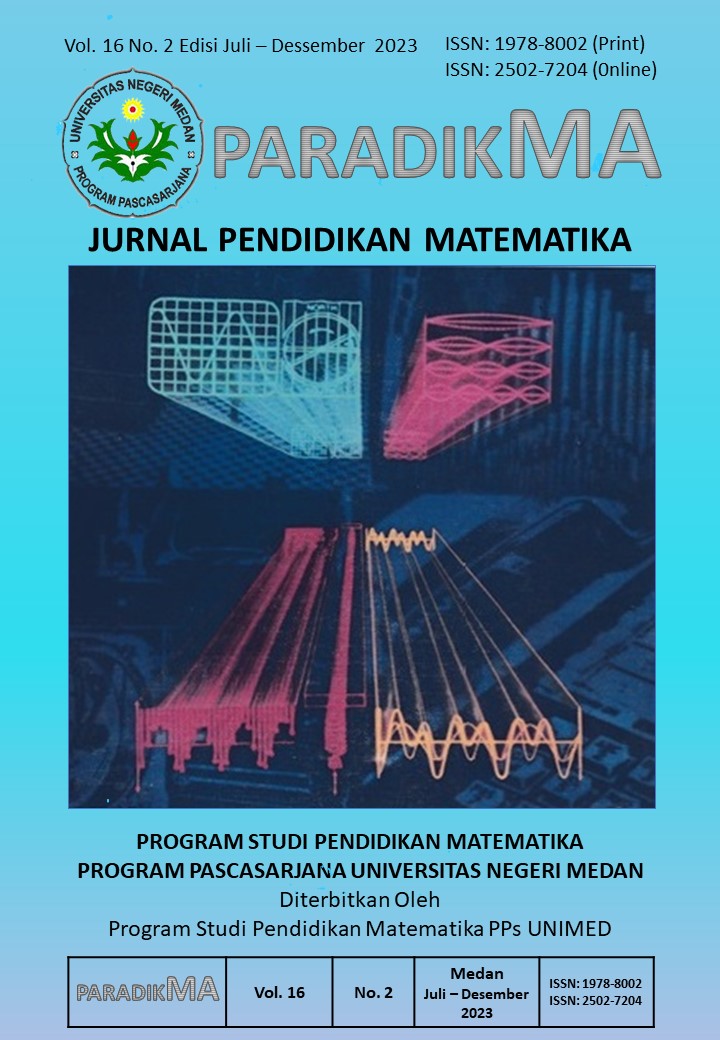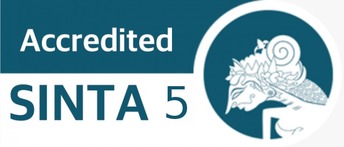Profile of Students' Computational Thinking Using Problem-Based Learning Models In Review From Learning Style at SMA N 1 Langsa
DOI:
https://doi.org/10.24114/paradikma.v16i2.48110Abstract
This research examines students' computational thinking abilities in problem-based learning (PBL) classes. (2) Kolb's learning style profile towards students' computational thinking in the PBL context. This type of qualitative research is descriptive in nature, analyzing class XI MIA 4 students at SMAN 1 Langsa using data reduction techniques in assessing Kolb-type learning styles, computational thinking tests, interviews, and documentation. (1) The results of the computational thinking test using the problem-based learning (PBL) learning model showed that the low category was 9 people (25%), the medium category was 15 people (41.44%), and the high category was 12 people (33.33%). Nine low categories, 15 medium categories, and 12 high categories show this. Most students are intermediate computational thinkers. (2) Profile of MS participants with a convergent learning style with indications of decomposition (4 and 90.33%); pattern recognition (3 and 88.35%); thinking algorithm (3 and 72.85%); and patterns of abstraction and generalization (3 and 69.71%). Various learning styles with indications of decomposition (4 and 90.33%); pattern recognition (3 and 80.15%); thinking algorithm (3 and 71.85%); and pattern abstraction and generalization (3 and 69.40%) constitute the profile of DYZ subjects.Keywords: Students' Computational Thinking, Problem Based Learning, Kolb Learning Style.References
Afif., A.M.S., dkk. (2016). Analysis of Mathematical Reasoning Ability in View of Student Learning Styles in Problem Based Learning (PBL). Mathematics National Seminar X Semarang State University.
Anggraena., Y. (2021). PISA 2021 and Computational Thinking (CT). Learning Module. Curriculum Development Coordinator.
Ansori, M. (2020). Computational Thinking. DIRASAH Journal, 3(1), 112-123.
Bire, D. (2014). Pe the influence of Visual, Auditorial, and Kinesthetic Learning Styles on Student Achievement. Journal of Education, Postgraduate University of Nusa Cendana, 44(2), 168-174.
Danoebroto., S. W. (2020). A Analysis of Elementary School Teachers' Computational Thinking in Solving Scale-Related Problems. EDUMAT Journal, 11(1), 1“60.
Fardani, Z., Surya, E. dan M. (2021). Analysis of Student Self-Confidence in Learning Mathematics Through the Problem Based Learning Model. Paradigm Journal Of Mathematics Education,1(2), 39“51.
Hewi, La., Shaleh, M. (2020). Reflection on the Results of PISA (The Program For International Student Assessment): Improvement Efforts Focus on Children's Education. Golden Age Journal, Hamzanwadi University (Online), Vol.04 No., 3041.
Kalelioglu., F. (2018). Characteristics of Studies Conducted on Computational Thinking: A Content Analysis, in Computational Thinking in the STEM Disciplines Foundations and Research Highlights. Springer Internasional Publishing, 1.
Kamil., M. R. (2021). An Analysis of Computational Mathematical Thinking Ability of Class IX Students of SMP Negeri 1 Cikampek on the Material of Number Patterns. Journal of the Axioms, 12(2)., 259“270.
Lestari. (2015). PMathematics Education research. PT. Aditama Refika.
Minarni, A. (2018). The Influence of Problem-Based Learning on Mathematical Understanding Ability and Social Skills of State Junior High Schools in Bandung City. Journal of Paradikma Mathematics Education, 6 Number 2, Pages 162-174.
OECD. (2019). PISA 2018 Results: Insights and Interpretations. Rajagrafindo Persada.
Prihastyo., M. (2019). Problem Based Learning Approach to Problem Solving Ability and Mathematics Learning Independence in terms of Learning Style. Journal of Mathematical Research, 1(1): , 16“34.
Ramadan, et al. (2019). An Investigation of The Learning Style of Prospective Educators. The Online Journal of New Horizons in Education, 1, 1-6.
Ripai., I. (2019). Analysis of Problem Solving Ability Using Problem Based Learning Learning Model. Process.
Rustam.E., Sidabutar.D.R., & S. E. 2017. (2017). Improving Learning Activity and Students™ Problem Solving Skill through Problem Based Learning (PBL) in Junior High School. International. Journal of Sciences: Basic and Applied Research (IJSBAR, 33 No 2, 321-331.
Sinaga. C. V. R. (2020). Development of Mathematics Learning Devices. Aswaja Youth Forum.
Sugiyono. (2015). Quantitative Research Methods, Qualitative, and R&D. Alphabet.
Surya, E., & Syahputra, E. (2017). Improving High-Level Thinking Skills by Development of Learning PBL Approach on the Learning Mathematics for Senior High School Students. International Education Studies, 10 (8), 12“20.
Trianto. (2016). Designing an Innovative-Progressive Learning Model: Concept, Foundation, and Its Implementation at the Education Unit Level Curriculum (KTSP). golden.







